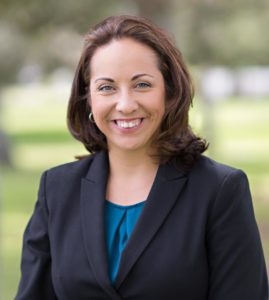Nevada school board member talks about the importance of teachers in children’s lives
This story was originally published on January 16, 2019 on UnidosUS’s education website ProgressReport.co.

Growing up as the daughter of a public school teacher in Nevada, State School Board Member Felicia Ortiz was well aware of the value of a solid education and the way teachers can be a positive influence on every aspect of a child’s life.
Keep up with the latest from UnidosUS
Sign up for the weekly UnidosUS Action Network newsletter delivered every Thursday.
“I saw the struggles she went through, trying to teach kids who don’t have a toothbrush or haven’t had a meal that day. They’re often dealing with trauma at home, like maybe mom just dumped them at grandma’s again,” she says. While Ortiz doesn’t have any children of her own, she says she chose to represent Congressional District 3, including Las Vegas, Henderson, Boulder City, and much of unincorporated Clark County, so that she could be the “other mother” to 470,000 public school kids.
“I knew that that type of thing was happening here in Las Vegas, Nevada, exponentially because we have a really high poverty rate in Nevada,” Ortiz adds.
This month marks her third year serving on the board, and she plans to run again in 2020, touting the last several years of Nevada’s educational improvements. She also hopes her story will inspire other professionals to consider running for a state or local schoolboard, regardless of their parental status.
The position is a side job, and at $700 a year, it’s not a very well-paid one. But after a career spanning both business and educational programming, she says professionals like her need to hustle to improve positive outcomes for both kids and state and local economies.

By day, Ortiz runs a boutique consulting firm implementing project management software for construction projects. Prior to that, she worked as a manager in the time-share housing industry, and in 2005, she briefly served as a programmer for Platform Leaning, a program aimed at increasing tutoring services under the No Child Left Behind Act. In the latter role, she was tasked with coordinating tutoring programs for four schools made up primarily of English learners in high-poverty areas of town.
“It was eye-opening to see how far behind the kids were, and how hungry the teachers were to help them,” she says.
But getting kids with complex lives enrolled in and regularly attending tutoring programs proved so difficult that the organization closed down two months after Ortiz signed on. She returned to the business world, devoting her free time to volunteering with organizations such as Junior Achievement, Southern Nevada Latino Network, Habitat for Humanity, and Create a Change Now. By 2015, she started wondering if the volunteer work was enough.
“I just felt like nothing I was doing was moving my needle enough and that our Latino kids weren’t well-represented on any of the boards, specifically education,” she says. Then in February 2016, the resignation of School Board member Allison Serafin left a seat open on the board.
“I wasn’t really fond of politics, but three different people sent letters suggesting I apply,” she says.
That same month, Republican Governor Brian Sandoval appointed Ortiz to the role, and in the following November 2016 elections, Ortiz was elected to a full term.
Aware of the struggles of implementing No Child Left Behind, she joined an advisory group to work on implementation of the 2016 federal legislation that followed, the Every Student Succeeds Act (ESSA).
“Nevada has about 30% Latino students statewide, but here in Clark County, which is the fifth largest school district in the country, we have 48% Latino students, and about 30% of our students are English-language learners, so we put this plan together to make sure that it has the accountability in place to ensure all students are being addressed,” she says.
And with Clark County expecting as many as 1.2 million residents over the next decade, addressing equity gaps is not only good ethics, it’s good business, says Ortiz, noting that ESSA can play a role in both areas.
Unlike some state ESSA plans that measure school performance by grades, Nevada’s plan uses a five-star system in which schools can only receive the full five stars if they show improvement for all students, including English learners and students who are low-income or have disabilities. This grading system is required of public and charter schools alike, and Ortiz says the impact is already evident.
“Improving our schools is imperative to keeping our state economically viable, and we’ve definitely seen growth in the last two years,” she says. For example, last year Nevada saw a graduation rate of 83.17%, the highest in state history, and the number of Nevada students participating in AP computer science courses grewby 127 % over the year before, more than double the national expansion rate of 50%. These same courses saw a 175% growth rate among females and 179% among Latinos.
Those are important steps for one of the fastest-growing state in the union, one whose demographics are also representative of larger national trends. For example, Las Vegas’s residents speak some 30 different languages and their diverse backgrounds reflect what the United States will likely look like in the next four decades.
Now, with the ESSA plan in place, the next step is to figure out which schools and school districts need the most funding. That’s a tough call in a state which ranks 48th in the nation for school funding, and more so because the state doesn’t have enough facilities to house students in its fastest growing urban areas and or enough transportation for getting students to school in its rural ones.
“The formula that we’re currently using hasn’t changed much, since 1967,” laments Ortiz, explaining that while authorities address these issues, they must simultaneously redirect funds to support schools failing to meet all students under the ESSA plan.
And yet, she says she’s hopeful the state has the political will to address these concerns. The previous Governor Sandoval, a moderate Republican, was credited with signing several bills to overhaul the state education system to increase funding for public schools, teacher recruitment, professional training, and expansion of preschool and full-day kindergarten. And in the November 2018 elections, voters elected a high number of Democrats, including Governor Steve Sisolak. He wants to increase teacher salaries, reduce class sizes, and make it easier for individuals and private businesses to give money for school projects and facilities.
“We’re not anticipating a huge increase in funding, but we’ll obviously hopefully get some,” says Ortiz.
Where will it come from? Those details will be the main focus of Nevada’s 2019 legislative session. Currently the state decreases its contribution as local districts raise money through property and other local taxes. During the last election, Nevada voted to legalize marijuana and earmark its sales tax for education. Finally, Ortiz is hoping legislators can move state money from a rainy day fund into a distributive school account.
At the same time, the Nevada State Board of Education is working to obtain the teachers and the training those teachers need to serve this growing and increasingly diverse student body. In fact, they hope to inspire some of the state’s current middle and high school students to consider a career in teaching by designing a mentoring and scholarship program called the Great Teaching and Reading Fund.
For now, Ortiz says it’s important that all state residents – parents and non – to model good educational leadership by getting involved.
“God bless the parents that put up their time and effort to do it because it’s a lot of work. They’re definitely sacrificing time with their own children for the good of all children, but I think those of us that don’t have kids have the opportunity and the wherewithal,” she says. “At the end of the day, if you can, you should, right?”
-Author Julienne Gage is the senior web content manager of Progress Report.

